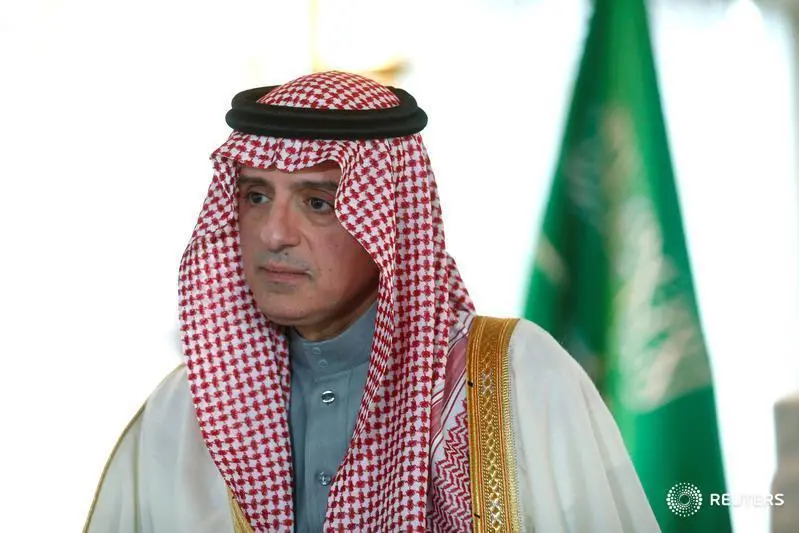PHOTO
Saudi Foreign Minister Adel al-Jubeir questioned on Friday the German government’s decision to bar weapons exports to countries that are involved in the war in Yemen.
He said: “We do not rely on German exports and we therefore do not need their arms.”
“We can get them from some where else,” he told the German news agency (dpa) while on a trip to Brussels.
During recent negotiations to form a coalition government, German parties agreed to stop arms shipments to all countries that are taking part in the war in Yemen.
Jubeir added: “The war in Yemen is legitimate.”
He went on to say that the German government does not discriminate between one state and another when it comes to weapons exports, adding that Berlin refuses to support countries that are waging a legitimate war in Yemen.
Despite the criticism, the Saudi minister underlined the solid ties between Berlin and Riyadh, describing them as “excellent.”
He hoped that a new chapter in relations would be opened after the formation of the new German government.
“We hope they would return to how they were in the past,” said Jubeir.
The minister had earlier met in Brussels with members of the European Parliament and addressed a number of regional issues.
On the crisis with Qatar, he stressed that the four boycotting countries want Doha to return to the Gulf fold. This can be achieved once it stops supporting and financing terrorism.
“Qatar’s real image is different from how the world media is portraying it. It is hiding behind a dark facade that support terrorism,” he stated.
Addressing the Iran, he said that the 2015 nuclear deal it signed with world powers should be amended due to some “shortcomings.”
“The Kingdom supports any agreement that prevents Iran from obtaining nuclear capabilities and that guarantees a steady and solid inspection mechanism and punitive measures in case Tehran does not comply with it. I think this is the position of the administration of US President Donald Trump also,” he said.
“We think the inspection system on the nuclear agreement is weak and should include undeclared military sites. The inspection is limited to declared locations and this is not enough because most of the places associated with its nuclear program were not disclosed by Iran; for example, the site near the Qom City,” he added.
Tackling the Syrian crisis, the Saudi FM said: “We believe in solutions that are based on United Nations Security Council resolution 2254. We believe that there should be a political process and a new constitution for Syria. There must also be new elections."
The solution lies in ending the fighting, restoring stability and allowing humanitarian aid to reach the people.
With regards to human rights and the judicial system in Saudi Arabia, al-Jubeir stressed that all countries must respect the judicial sovereignty of the Kingdom.
“Just as the United States has the death penalty, Saudi Arabia has a judicial system that also includes the death penalty,” he remarked.
He said: “We do not rely on German exports and we therefore do not need their arms.”
“We can get them from some where else,” he told the German news agency (dpa) while on a trip to Brussels.
During recent negotiations to form a coalition government, German parties agreed to stop arms shipments to all countries that are taking part in the war in Yemen.
Jubeir added: “The war in Yemen is legitimate.”
He went on to say that the German government does not discriminate between one state and another when it comes to weapons exports, adding that Berlin refuses to support countries that are waging a legitimate war in Yemen.
Despite the criticism, the Saudi minister underlined the solid ties between Berlin and Riyadh, describing them as “excellent.”
He hoped that a new chapter in relations would be opened after the formation of the new German government.
“We hope they would return to how they were in the past,” said Jubeir.
The minister had earlier met in Brussels with members of the European Parliament and addressed a number of regional issues.
On the crisis with Qatar, he stressed that the four boycotting countries want Doha to return to the Gulf fold. This can be achieved once it stops supporting and financing terrorism.
“Qatar’s real image is different from how the world media is portraying it. It is hiding behind a dark facade that support terrorism,” he stated.
Addressing the Iran, he said that the 2015 nuclear deal it signed with world powers should be amended due to some “shortcomings.”
“The Kingdom supports any agreement that prevents Iran from obtaining nuclear capabilities and that guarantees a steady and solid inspection mechanism and punitive measures in case Tehran does not comply with it. I think this is the position of the administration of US President Donald Trump also,” he said.
“We think the inspection system on the nuclear agreement is weak and should include undeclared military sites. The inspection is limited to declared locations and this is not enough because most of the places associated with its nuclear program were not disclosed by Iran; for example, the site near the Qom City,” he added.
Tackling the Syrian crisis, the Saudi FM said: “We believe in solutions that are based on United Nations Security Council resolution 2254. We believe that there should be a political process and a new constitution for Syria. There must also be new elections."
The solution lies in ending the fighting, restoring stability and allowing humanitarian aid to reach the people.
With regards to human rights and the judicial system in Saudi Arabia, al-Jubeir stressed that all countries must respect the judicial sovereignty of the Kingdom.
“Just as the United States has the death penalty, Saudi Arabia has a judicial system that also includes the death penalty,” he remarked.
Copyright © Saudi Research and Publishing Co. All rights reserved. Provided by SyndiGate Media Inc. (Syndigate.info).





















